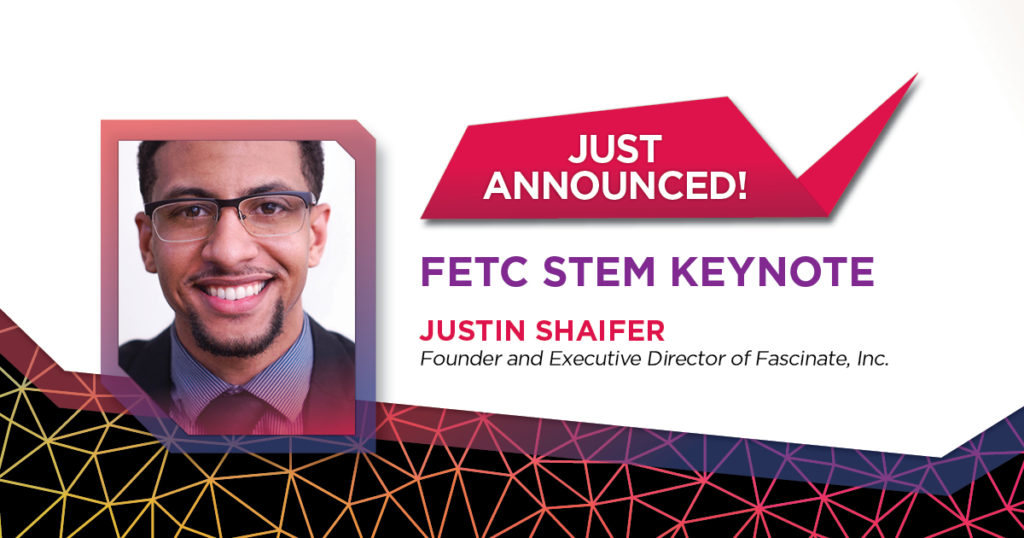FETC 2020: A Focus on STEM and Underrepresented Students
FETC recognizes the challenges and roadblocks school districts and educators face when trying to provide equitable access to STEM education for all students.
According to the National Science Foundation, students need in-depth, high-quality educational STEM experiences to succeed in the “information-based and highly technological society.” Across the country, districts recognize STEM education as a priority and are implementing programming that provides K12 students with hands-on, project-based STEM lessons. Yet, based on a 2018 report, STEM education is not an equitable experience for all school districts nor all students. In the case of the haves and have nots, school districts in low-income areas with limited funding resources struggle to provide students with access to computer science classes, comprehensive STEM programs, and adequately equipped science labs. Even more disturbing is that underrepresented students, such as girls,students of color, students with learning disabilities, and students in low socioeconomic backgrounds, are not regularly presented with learning opportunities that would expose them to challenging STEM.
FETC (Future of Educational Technology Conference) recognizes the challenges and roadblocks school districts and educators face when trying to provide equitable access to STEM education for all students. Celebrating its 40th anniversary in Miami, Florida, on January 14- 17, 2020, FETC once again will prove itself as one of the top edtech conferences to attend this year. With a wealth of STEM sessions, workshops, learning labs, and school tours, attendees will experience proven strategies and solutions to combat the growing numbers of students with little or no exposure to STEM projects.

STEM Keynote
No one is more in tune to the urgency of ensuring that all students, especially those in the underrepresented categories, have an abundance of STEM educational opportunities than Justin Shaifer. Shaifer, aka Mr. Fascinate, is the founder and executive director of Fascinate, Inc., a nonprofit organization that provides culturally responsive lesson plans and experiences to students across the US. During FETC 2020, this high energy 24-year-old will engage attendees with his STEM Keynote presentation, “Bring STEM to Class: A Practical Guide to Education.” Shaifer’s goal “to be for STEM what ESPN is for sports” and to inspire young people to “embrace their inner nerd despite their surroundings.”
STEM Sessions
Echoing Shaifer’s mission to bring STEM education to every classroom and every student are the courageous, committed, and visionary edtech leaders, educators, and support staff presenting at FETC 2020. Within the six edtech strands that have become synonymous with FETC, numerous sessions focus on innovative practices and solutions to ensure students are positioned well for the yet to be created STEM positions that will be available when they graduate.
Sessions such as Coding in K-8 Classrooms: Empowering Creativity and Content Creation, Cross-Curricular STEAM Integration for Every Classroom, and Collaborating Across Curriculums Using Digital Tools and Maker Space highlight the importance of ensuring that makerspaces are not the only place students learn science, technology, engineering, and real-world math applications. These sessions reflect the belief that when integrated across curriculum areas, coding exposes more students to STEM education resulting in students who are more engaged, energized, and active participants in their learning.
Educators recognize but don’t always have the skillset to connect and engage underrepresented students in areas such as STEM. Encouraging Underrepresented Populations to Engage and Stay in STEM, Engaging Students in 21st Century Skills Through an Engineering Mindset and Hero Elementary: Designing Accessible Digital Experiences to Promote STEM Equity sessions showcase how classroom teachers can champion inclusion by connecting students to content-rich STEM experiences while supporting their needs and learning struggles.
When school districts have the necessary funding and educators have the tools, skills, and resources to provide multiple opportunities for students to have hands-on STEM learning opportunities, the playing field becomes leveled for underrepresented students. Attending FETC 2020 is an opportunity for edtech leaders and educators to learn about the struggles of underrepresented students, interact with colleagues on common issues and leave with strategies and solutions to the barriers many of our students experience in STEM education.
Tools and ideas to transform education. Sign up below.
Eileen Belastock, CETL (@EileenBelastock) is a Director of Academic Technology in Massachusetts.
